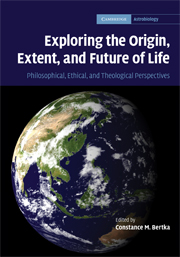 Exploring the Origin, Extent, and Future of Life
Exploring the Origin, Extent, and Future of Life Book contents
- Frontmatter
- Contents
- List of contributors
- Acknowledgements
- 1 Astrobiology in a societal context
- Part I Origin of life
- 2 Emergence and the experimental pursuit of the origin of life
- 3 From Aristotle to Darwin, to Freeman Dyson: changing definitions of life viewed in a historical context
- 4 Philosophical aspects of the origin-of-life problem: the emergence of life and the nature of science
- 5 The origin of terrestrial life: a Christian perspective
- 6 The alpha and the omega: reflections on the origin and future of life from the perspective of Christian theology and ethics
- Part II Extent of life
- Part III Future of life
- Index
- References
6 - The alpha and the omega: reflections on the origin and future of life from the perspective of Christian theology and ethics
from Part I - Origin of life
Published online by Cambridge University Press: 29 December 2010
- Frontmatter
- Contents
- List of contributors
- Acknowledgements
- 1 Astrobiology in a societal context
- Part I Origin of life
- 2 Emergence and the experimental pursuit of the origin of life
- 3 From Aristotle to Darwin, to Freeman Dyson: changing definitions of life viewed in a historical context
- 4 Philosophical aspects of the origin-of-life problem: the emergence of life and the nature of science
- 5 The origin of terrestrial life: a Christian perspective
- 6 The alpha and the omega: reflections on the origin and future of life from the perspective of Christian theology and ethics
- Part II Extent of life
- Part III Future of life
- Index
- References
Summary
Astrobiology, encompassing the search for life on other planets, laboratory studies of the origin of early life forms from precursor materials, and prospects for the discovery of microbial life on other planets reflects outcomes at the cutting edge of science and technology. Yet the issues that such investigations raise are profound, for not only do they bear on our own sense of self in relation to the cosmos, but they also raise deep philosophical and religious issues concerned with purpose, meaning, and human identity. Given these profound challenges, the ethical and moral frameworks within which such developments take place need to be carefully considered, for outcomes of such deliberations have public and social importance alongside a potential scientific gain. The intention of this chapter is to:
analyze those philosophical and theological themes that arise in the context of the origin of life, focusing particularly on the intersection of physical and evolutionary parameters in the interplay of chance and necessity, alongside debates around purpose and design;
consider some of the ethical issues associated with both the origin and future of life from a Christian ethical perspective, including responsibility for future generations;
argue for the recovery of a sense of wisdom, from both a theological perspective and through phronesis or practical wisdom.
It would be impossible to do justice to the full range of possible positions that a theologian might take in relation to theological and ethical issues raised by astrobiology.
- Type
- Chapter
- Information
- Exploring the Origin, Extent, and Future of LifePhilosophical, Ethical and Theological Perspectives, pp. 96 - 112Publisher: Cambridge University PressPrint publication year: 2009
References
- 2
- Cited by


